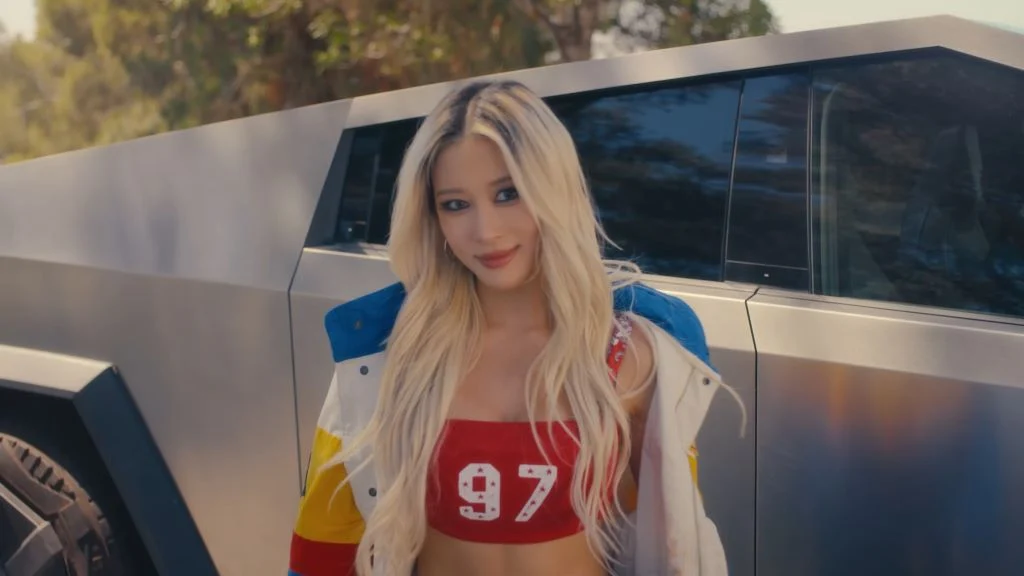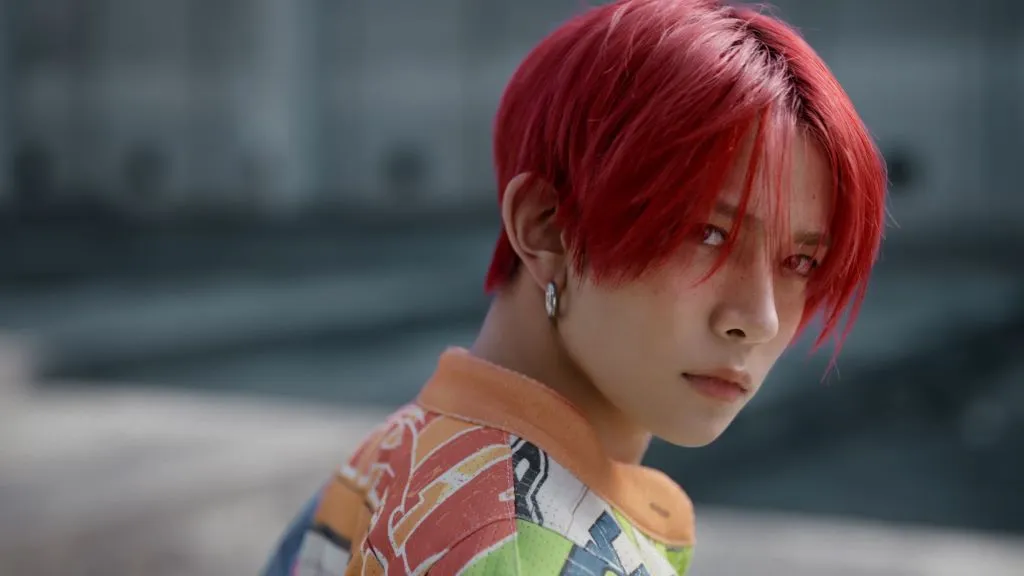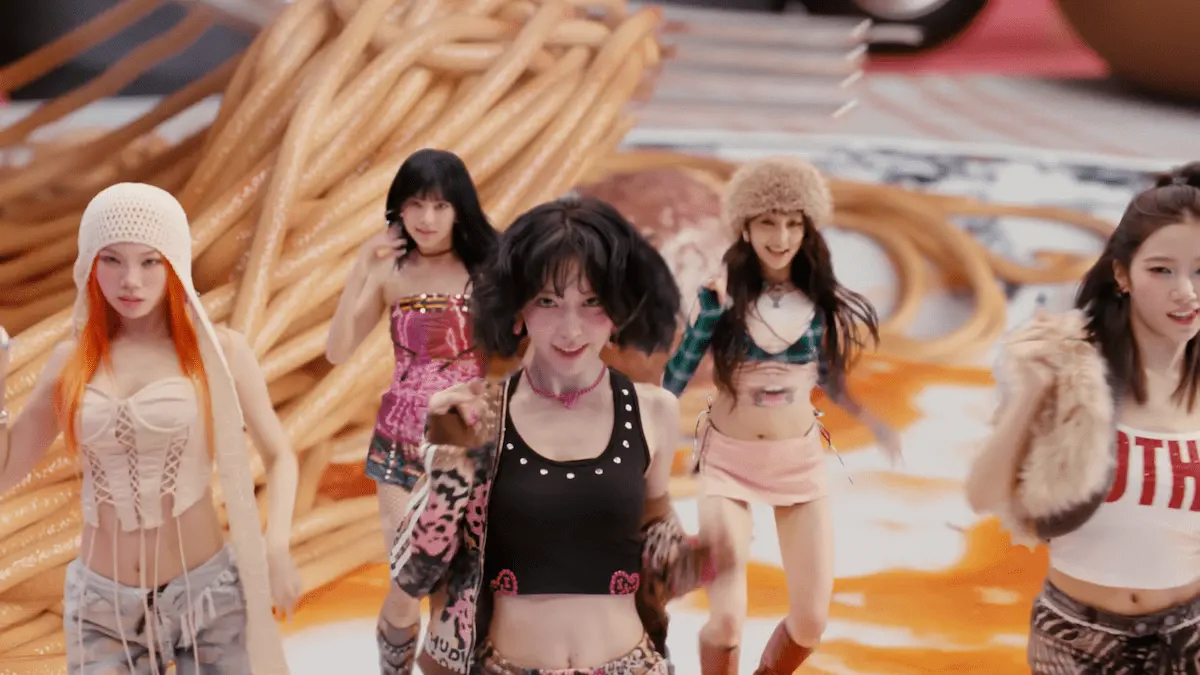[Dayoung] 'body' MV Explained: A Nine-Year Metamorphosis into a Solo Rockstar
I'll be honest—I had no idea what to expect when I clicked on Dayoung's solo debut. The cute, bubbly Dayoung from WJSN? Doing... this? But three seconds into "body," I realized: this isn't the Dayoung we thought we knew. This is the Dayoung she's been waiting nine years to show us. And I'm not ready for how good this is.

Source: Official StarshipTV YouTube (© Starship Entertainment)
Table of Contents (Find Your Story)
Quick Summary: The Vibe Check
Let me tell you what happened when I first watched this: I genuinely thought I had the wrong video open.
This is Dayoung? The Dayoung from Chocome? The one who was doing cute concepts and variety shows? Because the woman I’m watching right now looks like she walked off a California beach, got tan on purpose, and decided to become the main character of her own story.
“body” isn’t just a solo debut—it’s a declaration. After nine years of being one voice in a ten-member group, Dayoung took three years to prepare this moment. And you can feel every single day of that preparation. The confidence in her movement, the way she owns every frame, the sheer determination radiating from her eyes—this is what happens when someone finally gets to show what they’ve been holding back.
The song itself? A funky, groove-driven pop track that sounds like late summer feels—when it’s still hot but the nights are getting cooler, when you’re not ready to let go but you know things are changing. It’s the perfect metaphor for this entire debut.
Credits
The Story You See on Screen
The video opens with Dayoung in a stark white room, staring at herself in an oversized mirror. And I know what you’re thinking—”oh, another self-reflection concept”—but wait. Look at her face. That’s not the expression of someone seeking validation. That’s someone who’s already made peace with who they are and is ready to prove it.
There’s no elaborate storyline here, no narrative twists. Just Dayoung moving through spaces that get progressively darker, moodier, more her. The white room gives way to reds and blacks, and with each transition, you can see her shedding layers of what people expected her to be.
What got me was how the dancers function in this video. They’re not backup—they’re amplifiers. They make her look even more powerful by comparison. When she’s standing center frame and they’re all moving around her, that’s not choreography. That’s a visual representation of everyone orbiting around her energy.
The Moments That Define the Video
The Blue Smokey Eye Opener (0:42-0:44)
Multiple fans couldn’t stop talking about this moment—when Dayoung opens her eyes with that intense blue smokey makeup. One comment nailed it: “미쳐버린 블루 스모키 눈 뜰때 너무 섹시함” (The crazy blue smokey eye opening is so sexy). It’s not just makeup; it’s a declaration. This is the face of someone who’s done being cute.
The Beat Drop at 1:48
Fans described this as “Barbie vibes,” and they’re not wrong. There’s something about how the production shifts here—it’s playful but powerful, nostalgic but fresh. It captures that 2010s pop energy but filtered through 2025 sensibilities.
The Christina Aguilera Moment (2:12)
This shot had fans making direct comparisons to Christina Aguilera’s peak era. “와 이장면 충격이네… 완전 크리스티나 아길레라 전성기시절 느낌남” (This scene is shocking… totally feels like Christina Aguilera’s prime era). When a K-pop idol evokes that level of Western pop star energy, you know something clicked.
The Arm-Rolling Choreography (2:29)
This move became iconic instantly. Fans described it as “쾌감 미치겠어요” (the satisfaction is insane). It’s a simple gesture—rolling your arms—but the way Dayoung executes it with absolute confidence makes it feel like a victory lap. Like she’s literally shaking off every doubt anyone ever had about her.
The Sunlight Finale (2:40)
The ending sequence where sunlight cascades over her body while she moves—fans got emotional about this. “햇살비추면서 사람 몸을 타고흐르는 음영과 밝고 기운찬 움직임이 너무너무 감동을 준다” (The shadows and light flowing over her body with bright, energetic movements are so moving). It’s the visual representation of finally stepping into your own light after years in someone else’s shadow.
The final shots—those power stances, that confident smirk—aren’t trying to be an “ending fairy.” She’s not being cute. She’s being formidable. And the difference is everything.
Lyrics & meaning
What “Gonna Love Me, Right?” Actually Means
Let’s talk about that album title for a second. “gonna love me, right?” could be a question. It could also be a command. And I think that duality is the entire point.
This isn’t Dayoung asking for approval. It’s Dayoung saying “you’re going to love me, right? Because I already do, so you might as well catch up.”
The lyrics hit differently when you know how long she waited for this. “I’m a new type of story” isn’t just a catchy line—it’s her drawing a line between WJSN Dayoung and solo artist Dayoung. She’s literally narrating her own reinvention in real-time.
The Body Positivity That’s Actually Radical
When she sings “Gonna love my body,” yeah, it’s about body positivity. But in K-pop? Where an idol’s body is managed, monitored, discussed, critiqued, and controlled by everyone except the idol themselves? That line is borderline revolutionary.
She’s not just saying she loves her physical form. She’s saying she loves her body of work. Her artistic output. Her choices. Everything that makes her her. And after watching her work this hard—the visible muscle definition, the tan (which is still controversial in K-pop), the unapologetic confidence—you believe her.
The Vocal Choice That Changes Everything
Here’s something that struck me: Dayoung is known as a main vocalist. She can hit high notes that would make other singers cry. But in “body,” she barely does any of that.
Her vocal delivery is restrained, conversational, almost nonchalant. She’s using a straight tone with minimal vibrato, prioritizing groove over vocal gymnastics. And at first I was like “why isn’t she showing off?”
Then I realized: she doesn’t need to anymore. She’s already proven she can sing. Now she’s proving she can be an artist with a point of view. The vocal restraint IS the flex.
Beneath the Surface: A Multi-Layered Analysis
The Fan Reactions That Tell the Real Story
What makes this debut so fascinating isn’t just what Dayoung did—it’s how fans responded. And I’m not just talking about UJUNGs (WJSN fans). I’m talking about random people stumbling onto this song and having their entire perception shift.
“이를 갈았다는게 뭔지 알겠다” (I understand what it means to grit your teeth and push through) - This comment with 4.5K likes captures something essential. Fans aren’t just seeing talent; they’re seeing effort. They’re seeing someone who refused to give up.
“간절함이 느껴진다” (I can feel the desperation/earnestness) appeared in multiple comments. In Korean entertainment, “간절함” is a specific kind of hunger—not desperation born of insecurity, but determination born of knowing exactly what you want and refusing to settle for less.
One international fan who came from TikTok said: “I had no idea she had this concept in mind and she executed it so well.” That’s the power of a well-kept secret. Nobody saw this coming, which made the impact exponentially stronger.
The Styling: Burning Down the Cosmic Concept
Can we talk about the styling for a minute? Because this is a complete and total repudiation of everything WJSN stood for aesthetically.
No more pastels. No more flowy skirts. No more soft, ethereal fabrics. Dayoung shows up in black leather crop tops and high-waisted pants like she’s auditioning to be in a 90s girl group—and I mean that in the best possible way.
Leather communicates toughness, rebellion, a certain kind of sexuality that K-pop has historically been uncomfortable with. The fact that Starship let her go this hard is… surprising? Impressive? Both?
The color palette shift is just as intentional. WJSN’s signature colors were whites, pinks, and blues—soft, dreamy, cosmic. “body” operates in reds and blacks—bold, grounded, human. It’s a visual before-and-after that doesn’t need explanation.
Even her tan is a statement. In an industry that still pushes pale skin as the ideal, Dayoung shows up sun-kissed and glowing, looking like she just got back from a beach vacation and couldn’t care less what the beauty standards think. As one fan put it: “뿌염 안한게 신의 한수” (Not dyeing her roots was a stroke of genius).
The “Touch My Body” Legacy
Multiple fans made the connection to SISTAR’s “Touch My Body”—Starship’s last major summer anthem success. “스타쉽 떡상 공식: body / Touch my body - 씨스타 / Body - 다영” (Starship’s success formula: anything with ‘body’ in the title).
But here’s what’s interesting: SISTAR had that summery, sexy concept from day one. It was their brand. Dayoung is reinventing herself into this space after nine years of a completely different image. That’s exponentially harder and, frankly, more impressive.
The Eric Nam and Exy Connection
Fans went wild when they saw the credits: Eric Nam and Exy (WJSN’s leader and main rapper) both contributed to the lyrics. One comment with 571 likes celebrated this: “Eric Nam and Exy have writing credits! Awesome!”
This matters because it shows Dayoung surrounded herself with people who understand her journey. Eric Nam knows what it’s like to carve out a unique space in K-pop. Exy has been Dayoung’s unnie (older sister) for nine years and understands her voice better than anyone. These aren’t random industry writers—these are collaborators who actually care about her narrative.
The International Appeal That Nobody Expected
One of the most surprising aspects of this debut is how well it’s resonating with non-K-pop fans. Multiple comments from people who “don’t really listen to K-pop” or “thought K-pop was just TikTok music” suddenly finding themselves obsessed.
“I had no idea she had this concept in mind” - International fan “The English pronunciation is almost perfect!” - Multiple comments “This could be a Western pop song” - Repeated observation
Dayoung essentially made a K-pop song that doesn’t sound like K-pop in the traditional sense. It sounds like early 2010s Western pop—think Carly Rae Jepsen’s “Call Me Maybe” era—but with 2025 production polish. That’s a very specific sweet spot that’s hard to hit.
The “It’s Never Too Late” Energy
Perhaps the most moving comments are from people in their late 20s and 30s who see themselves in Dayoung’s journey.
“평소 댓글도 잘 안쓰는편인데 요즘 그리웠던 분위기가 너무나 반가워서” (I usually don’t comment, but I had to because I missed this feeling so much) - From someone who usually just lurks
“나이 서른에 눈물이 또르르 났어요” (I’m 30 and tears just rolled down my face) - From someone struggling with their own career and self-image
These aren’t just comments about a good song. These are people seeing their own struggles reflected back at them through someone who refused to give up. Dayoung becomes proof that it’s not too late to reinvent yourself, to try again, to show the world what you’re really capable of.
Fan Takeaways
This debut gives fans something powerful: proof.
Proof that the nine years of waiting weren’t wasted. Proof that Dayoung always had this in her. Proof that when an artist is given creative control and time to prepare, the result speaks for itself.
For UJUNGs who’ve followed her since WJSN’s debut, this is validation—she wasn’t just “one of ten,” she was always capable of carrying a solo career. The pride isn’t just about her success; it’s about being right about her potential all along.
But there’s also a bittersweet gift here: the realization that this level of reinvention signals change. Solo projects this definitive often mean the group dynamic shifts. Fans take away both excitement for Dayoung’s future and a quiet acknowledgment that WJSN as they knew it might be evolving.
What fans ultimately walk away with is inspiration. The visible effort—three years of preparation, the physical transformation, the unwavering determination—becomes a reminder that dedication pays off. As one fan wrote: “준비된 사람에게는 준비한 것을 빛낼 기회가 꼭 찾아온다” (Opportunities to shine always come to those who are prepared).
The message is clear: it’s never too late to become who you were meant to be.
Frequently Asked Questions (Q&A)
Why did Dayoung wait nine years for a solo debut?
It's a combination of factors. WJSN was actively promoting until 2023, Starship had other priorities (they're also managing MONSTA X, IVE, and others), and most importantly—Dayoung wanted to be deeply involved in every creative decision. In interviews, she mentioned spending nearly three years preparing this album because she refused to release something that wasn't authentically her. That level of creative control takes time to negotiate, especially in the K-pop system.
What does the album title 'gonna love me, right?' actually mean?
The beauty of this title is its intentional ambiguity. It can read as a confident statement ("You're going to love me because I already do") or a vulnerable question ("Will you love me?"). Dayoung has said she wants listeners to find their own meaning in it, reflecting the album's themes of self-discovery and confidence coexisting with uncertainty. It's both an assertion and an invitation.
How does this debut compare to other WJSN member solos?
While members like Seola and Yeonjung have released solo music, Dayoung's debut is by far the most comprehensive in terms of scale, budget, and creative autonomy. This isn't positioned as a "side project" from WJSN's main vocalist—it's the launch of Dayoung as a standalone artist with a completely distinct identity. The level of reinvention here (image, sound, concept) is unprecedented for the group. As fans noted, this feels less like a solo single and more like a complete artist rebirth.
Why are fans comparing her to Christina Aguilera and SISTAR?
The Christina Aguilera comparisons (especially around the 2:12 mark) come from the confidence, the styling, and that specific brand of early 2000s pop star energy. The SISTAR comparisons are more about Starship's strategic positioning—both acts represent summer, confidence, and a more mature sexy concept. But Dayoung's journey is actually harder than SISTAR's because she's *transforming* into this concept after years of a completely different image, rather than starting with it.
Why is the song in English?
Multiple fans noted that singing in English gives the song a more sophisticated, international appeal while also preventing Korean listeners from over-analyzing every lyric. As one fan brilliantly explained: "영어로 불렀을 때 더 세련된 느낌이고, 한국어로 불렀다면 한국인 청자로 하여금 풍부한 생각을 하지 못하게 했을듯" (Singing in English makes it feel more refined, and if it were in Korean, it might limit the listener's imagination). English allows the song to be a vibe rather than a lyrical analysis project.
Sources & Technical Data
Credible Sources
- Dayoung (다영) 'body' Official MV
- Forbes: Dayoung Is Ready For Her Pop Rockstar Era
- NYLON Manila: Dayoung Steps Into Her Main Character Era
Special Thanks
To the fans whose genuine reactions and observations shaped this analysis. The comments section became a testament to what happens when an artist’s authenticity resonates beyond just their existing fandom. Special recognition to the person who wrote “준비된 사람에게는 준비한 것을 빛낼 기회가 꼭 찾아온다” (Opportunities always come to those who are prepared) - that’s the entire story of this debut in one sentence.




Comments